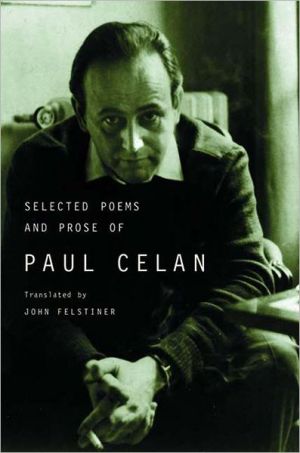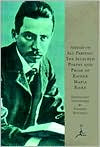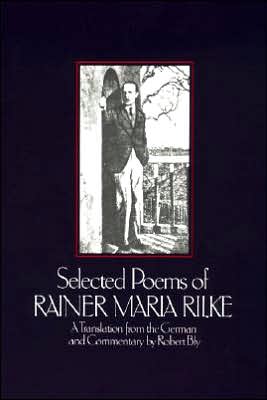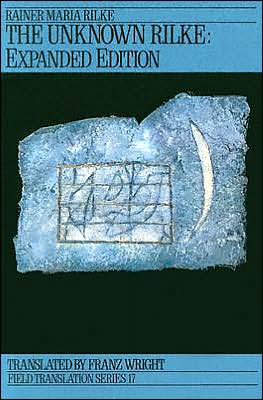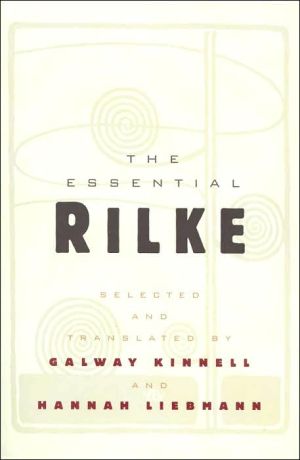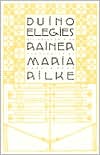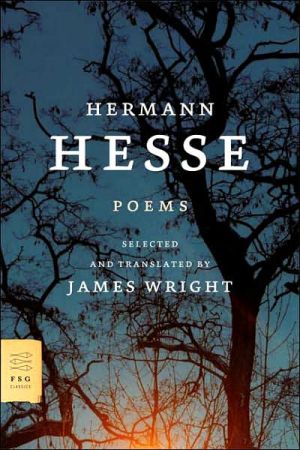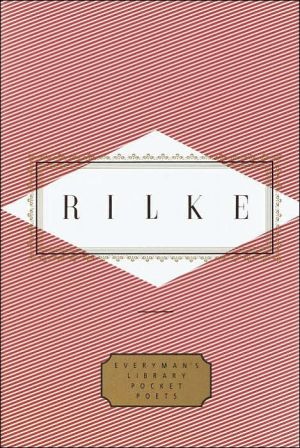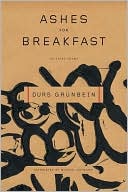Selected Poems and Prose of Paul Celan
The most wide-ranging volume of the work of Europe's leading postwar poet, including previously unpublished writings.\ Paul Celan was born in 1920 in the East European province of Bukovina. Soon after his parents, German-speaking Jews, had perished at the hands of the Nazis, Celan wrote "Todesfuge" ("Deathfugue"), the most compelling poem to emerge from the Holocaust. Self-exiled in Paris, for twenty-five years Celan continued writing in his German mother tongue, although it had "passed...
Search in google:
The most wide-ranging volume of the work of Europe's leading postwar poet, including previously unpublished writings.New York Times Book ReviewRespectful, nuanced renderings...invaluable for classroom use and for all readers interested in the full range of Celan's writing.
\ \ \ \ \ Excerpt\ \ \ TODESFUGE\ \ \ Schwarze Milch der Frühe wir trinken sie abends\ wir trinken sie mittags und morgens wir trinken sic nachts\ wir trinken und trinken\ wir schaufeln ein Grab in den Lüften da liegt man nicht eng\ Ein Mann wohnt im Haus der spielt mit den Schlangen der schreibt\ der schreibt wenn es dunkelt nach Deutschland dein goldenes Haar\ Margarete\ er schreibt es und tritt vor das Haus und es blitzen die Sterne er pfeift\ seine Rüden herbei\ er pfeift seine Juden hervor lässt schaufeln ein Grab in der Erde\ er befiehlt uns spielt auf nun zum Tanz\ Schwarze Milch der Frühe wir trinken dich nachts\ wir trinken dich morgens und mittags wir trinken dich abends\ wir trinken und trinken\ Ein Mann wohnt im Haus der spielt mit den Schlangen der schreibt\ der schreibt wenn es dunkelt nach Deutschland dein goldenes Haar\ Margarete\ Dein aschenes Haar Sulamith wir schaufeln ein Grab in den Lüften\ da liegt man nicht eng\ Er ruft stecht tiefer ins Erdreich ihr einen ihr andern singet und spielt\ er greift nach dem Eisen im Gurt er schwingts seine Augen sind blau\ stecht tiefer die Spaten ihr einen ihr andern spielt weiter zum Tanz auf\ Schwarze Milch der Frühe wir trinken dich nachts\ wir trinken dich mittags und morgens wir trinken dich abends\ wir trinken und trinken\ ein Mann wohnt im Haus dein goldenes Haar Margarete\ deinaschenes Haar Sulamith er spielt mit den Schlangen\ \ \ * * *\ \ \ Er ruft spielt süsser den Tod der Tod ist ein Meister aus Deutschland\ er ruft streicht dunkler die Geigen dann steigt ihr als Rauch in die Luft\ dann habt ihr ein Grab in den Wolken da liegt man nicht eng\ Schwarze Milch der Frühe wir trinken dich nachts\ wir trinken dich mittags der Tod ist ein Meister aus Deutschland\ wir trinken dich abends und morgens wir trinken und trinken\ der Tod ist ein Meister aus Deutschland sein Auge ist blau\ er trifft dich mit bleierner Kugel er trifft dich genau\ ein Mann wohnt im Haus dein goldenes Haar Margarete\ er hetzt seine Rüden auf uns er schenkt uns ein Grab in der Luft\ er spielt mit den Schlangen und träumet der Tod ist ein Meister aus\ Deutschland\ dein goldenes Haar Margarete\ dein aschenes Haar Sulamith\ \ \ DEATHFUGUE\ \ \ Black milk of daybreak we drink it at evening\ we drink it at midday and morning we drink it at night\ we drink and we drink\ we shovel a grave in the air where you won't lie too cramped\ A man lives in the house he plays with his vipers he writes\ he writes when it grows dark to Deutschland your golden hair\ Margareta\ he writes it and steps out of doors and the stars are all sparkling he\ whistles his hounds to stay close\ he whistles his Jews into rows has them shovel a grave in the ground\ he commands us play up for the dance\ Black milk of daybreak we drink you at night\ we drink you at morning and midday we drink you at evening\ we drink and we drink\ A man lives in the house he plays with his vipers he writes\ he writes when it grows dark to Deutschland your golden hair\ Margareta\ Your ashen hair Shulamith we shovel a grave in the air\ where you won't lie too cramped\ He shouts dig this earth deeper you lot there you others sing up and play\ he grabs for the rod in his belt he swings it his eyes are so blue\ stick your spades deeper you lot there you others play on for the dancing\ Black milk of daybreak we drink you at night\ we drink you at midday and morning we drink you at evening\ we drink and we drink\ a man lives in the house your goldenes Haar Margareta\ your aschenes Haar Shulamith he plays with his vipers\ \ \ * * *\ \ \ He shouts play death more sweetly this Death is a master from\ Deutschland\ he shouts scrape your strings darker you'll rise up as smoke to the sky\ you'll then have a grave in the clouds where you won't lie too cramped\ Black milk of daybreak we drink you at night\ we drink you at midday Death is a master aus Deutschland\ we drink you at evening and morning we drink and we drink\ this Death is ein Meister aus Deutschland his eye it is blue\ he shoots you with shot made of lead shoots you level and true\ a man lives in the house your goldenes Haar Margarete\ he looses his hounds on us grants us a grave in the air\ he plays with his vipers and daydreams der Tod ist ein Meister aus\ Deutschland\ dein goldenes Haar Margarete\ dein aschenes Haar Sulamith\ \ \ MIT WECHSELNDEM SCHLUSSEL\ \ \ Mit wechselndem Schlüssel\ schliesst du das Haus auf, darin\ der Schnee des Verschwiegenen treibt.\ Je nach dem Blut, das dir quillt\ aus Aug oder Mund oder Ohr,\ wechselt dein Schlüssel.\ Wechselt dein Schlüssel, wechselt das Wort,\ das treiben darf mit den Flocken.\ Je nach dem Wind, der dich fortstösst,\ ballt um das Wort sich der Schnee.\ \ \ WITH A CHANGING KEY\ \ \ With a changing key\ you unlock the house where\ the snow of what's silenced drifts.\ Just like the blood that bursts from\ your eye or mouth or ear,\ so your key changes.\ Changing your key changes the word\ that may drift with the flakes.\ Just like the wind that rebuffs you,\ packed round your word is the snow.\ \ \ ZÜRICH, ZUM STORCHEN\ \ \ Vom Zuviel war die Rede, vom\ Zuwenig. Von Du\ und Aber-Du, von\ der Trübung durch Helles, von\ Jüdischem, von\ deinem Gott.\ Da-\ von.\ Am Tag einer Himmelfahrt, das\ Münster stand drüben, es kam\ mit einigem Gold übers Wasser.\ Von deinem Gott war die Rede, ich sprach\ gegen ihn, ich\ liess das Herz, das ich hatte,\ hoffen:\ auf\ sein höchstes, umröcheltes, sein\ haderndes Wort —\ Dein Aug sah mir zu, sah hinweg,\ dein Mund\ sprach sich dem Aug zu, ich hörte:\ Wir\ wissen ja nicht, weisst du,\ wir\ wissen ja nicht,\ was\ gilt.\ \ \ ZURICH, AT THE STORK\ \ \ Our talk was of Too Much, of\ Too Little. Of Thou\ and Yet-Thou, of\ clouding through brightness, of\ Jewishness, of\ your God.\ Of\ that.\ On the day of an ascension, the\ Minster stood over there, it came\ with some gold across the water.\ Our talk was of your God, I spoke\ against him, I let the heart\ I had\ hope:\ for\ his highest, death-rattled, his\ wrangling word —\ Your eye looked at me, looked away,\ your mouth\ spoke toward the eye, I heard:\ We\ really don't know, you know,\ we\ really don't know\ what\ counts.\ \ \ PSALM\ \ \ Niemand knetet uns wieder aus Erde und Lehm,\ niemand bespricht unsern Staub.\ Niemand.\ Gelobt seist du, Niemand.\ Dir zulieb wollen\ wir blühn.\ Dir\ entgegen.\ Ein Nichts\ waren wir, sind wir, werden\ wir bleiben, blühend:\ die Nichts-, die\ Niemandsrose.\ Mit\ dem Griffel seelenhell,\ dem Staubfaden himmelswüst,\ der Krone rot\ vom Purpurwort, das wir sangen\ über, o über\ dem Dorn.\ \ \ PSALM\ \ \ No one kneads us again out of earth and clay,\ no one incants our dust.\ No one.\ Blessed art thou, No One.\ In thy sight would\ we bloom.\ In thy\ spite.\ A Nothing\ we were, are now, and ever\ shall be, blooming:\ the Nothing-, the\ No-One's-Rose.\ With\ our pistil soul-bright,\ our stamen heaven-waste,\ our corona red\ from the purpleword we sang\ over, O over\ the thorn.\ \ \ WO?\ \ \ In den Lockermassen der Nacht.\ Im Gramgeröll und-geschiebe,\ im langsamsten Aufruhr,\ im Weisheitsschacht Nie.\ Wassernadeln\ nähn den geborstenen\ Schatten zusammen — er kämpft sich\ tiefer hinunter,\ frei.\ \ \ WHERE?\ \ \ At night in crumbling rockmass.\ In trouble's rubble and scree,\ in slowest tumult,\ the wisdom-pit named Never.\ Water needles\ stitch up the split\ shadow — it fights its way\ deeper down,\ free.
List of IllustrationsxvAcknowledgmentsxviiPrefacexixEarly Poems (1940-1943)Der Tote / The Dead Man2Finsternis / Darkness4Notturno / Nocturne6[Winter] / [Winter]8Nahe der Graber / Nearness of Graves10Der Einsame / The Lonely One12Schwarze Flocken / Black Flakes14Mohn und Gedachtnis (1952) Poppy and MemoryEin Lied in der Wuste / A Song in the Wilderness18Espenbaum / Aspen Tree20Der Sand aus den Urnen / The Sand from the Urns22Lob der Ferne / Praise of Distance24Spat und Tief / Late and Deep26Corona / Corona28Todesfuge / Deathfugue30Auf Reisen / On a Journey34In Agypten / In Egypt36Kristall / Crystal38Die Kruge / The Tankards40So bist du denn geworden / So you are turned42Der Reisekamerad / The Travel Companion44Landschaft / Landscape46Zahle die Mandeln / Count up the almonds48Von Schwelle Zu Schwelle (1955) from Threshold to ThresholdIch Horte Sagen / I Heard It Said52Zu Zweien / By Twos54Grabschrift fur Francois / Epitaph for Francois56Assisi / Assisi58Vor einer Kerze / In Front of a Candle60Mit Wechselndem Schlussel / With a Changing Key64Andenken / Remembrance66Nachtlich Geschurzt / Nocturnally Pursed68Welchen der Steine Du Hebst / Whichever Stone You Lift70In Memoriam Paul Eluard / In Memoriam Paul Eluard72Schibboleth / Shibboleth74Sprich Auch Du / Speak You Too76Argumentum e Silentio / Argumentum e Silentio78Die Winzer / The Vintagers82Inselhin / Islandward84Sprachgitter (1959) Speech-GrilleStimmen / Voices88Zuversicht / Confidence94Mit Brief und Uhr / With Letter and Clock96Unter ein Bild / Below a Painting98Schliere / Streak100Tenebrae / Tenebrae102Blume / Flower104Sprachgitter / Speech-Grille106Matiere de Bretagne / Matiere de Bretagne108Koln, am Hof / Cologne, at the Station110In die Ferne / Into the Distance112Entwurf einer Landschaft / Sketch of a Landscape114Ein Auge, Offen / An Eye, Open116Engfuhrung / Stretto118Die Niemandsrose (1963) the No-One's-RoseEs war Erde in ihnen / There was earth inside them134Das Wort vom Zur-Tiefe-Gehn / The word about going-to-the-depths136Bei Wein und Verlorenheit / With wine and lostness138Zurich, Zum Storchen / Zurich, at the Stork140Selbdritt, Selbviert / By Threes, by Fours142Dein Hinubersein / Your being over there144Zwolf Jahre / Twelve Years146Mit allen Gedanken / With all my thoughts148Die Schleuse / The Sluice150Stumme Herbstgeruche / Mute autumn smells152Eis, Eden / Ice, Eden154Psalm / Psalm156Tubingen, Janner / Tubingen, January158Eine Gauner- und Ganovenweise / A Rogues' and Gonifs' Ditty160... Rauscht der Brunnen / ... The Wellspring Rushes164Radix, Matrix / Radix, Matrix166Einem, der vor der Tur stand / To one who stood before the door170Mandorla / Mandorla172Benedicta / Benedicta174Die hellen Steine / The bright stones176Ein Wurfholz / A boomerang178Hawdalah / Havdalah180Nachmittag mit Zirkus und Zitadelle / Afternoon with Circus and Citadel182Ich habe Bambus geschnitten / I have cut bamboo184Was geschah? / What happened?186In Eins / In One188Hinausgekront / Crowned out190Wohin mir / Where the word194Huttenfenster / Tabernacle Window196Die Silbe Schmerz / The Syllable Pain200Es ist alles anders / It's all different204In der Luft / In the air210Atemwende (1967) BreathturnDu darfst / You may222In die Rillen / Into the grooves224In den Flussen / In rivers226Die Zahlen / The numbers228Weissgrau / Whitegray230Mit erdwarts gesungenen Masten / With masts sung earthward232Schlafenzange / Temple-pincers234Stehen / To stand236Mit den Verfolgten / With the persecuted238Fadensonnen / Threadsuns240Im Schlangenwagen / In the reptile-car242Ich kenne dich / I know you244Weggebeizt / Etched away246Vom grossen / Scooped248Keine Sandkunst mehr / No more sand art250Hohles Lebensgehoft / Hollow homestead of life252Schwarz / Black254Landschaft / Landscape256In Prag / In Prague258Aschenglorie / Ash-aureole260Das Geschriebene / What's written262Wo? / Where?264Konigswut / King's rage266Solve / Solve268Coagula / Coagula270Osterqualm / Paschal smoke272Schaufaden, Sinnfaden / Show-fringes, sense-fringes274Ein Drohnen / A rumbling276Schlickende / Oozing278Einmal / Once280Fadensonnen (1968) ThreadsunsFrankfurt, September / Frankfurt, September284Die Spur eines Bisses / The trace of a bite286All deine Siegel erbrochen? Nie. / All your seals broken? Never288Schlafbrocken / Sleepscraps290Die fleissigen / Industrious292Wenn ich nicht weiss, nicht weiss / When I don't know, don't know294Du warst / You were296Tau / Dew298Uppige Durchsage / Profuse announcement300Nah, im Aortenbogen / Near, in the aorta's arch302Weil du den Notscherben fandst / Because you found the trouble-shard304Denk Dir / Just Think306Lichtzwang (1970) Light-CompulsionHorreste, Sehreste / Remnants of hearing, of seeing310Wir lagen / We lay312Todtnauberg / Todtnauberg314Klopf / Knock316Fahlstimmig / Wan-voiced318Schaltjahrhunderte / Leap-centuries320Du sei wie du / You be like you322Wirk nicht voraus / Do not work ahead324Schneepart (1971) Snow-PartDu liegst / You lie328Das angebrochene Jahr / The broached year330Unlesbarkeit / Illegible332Ich hore, die Axt hat gebluht / I hear, the axe has flowered334Die nachzustotternde Welt / World to be stuttered after336Zur Nachtordnung / To night's order338Fur Eric / For Eric340Ein Blatt / A leaf342Einkanter / In-edger344Leuchtstabe / Flashlights346Zeitgehoft (1976) Homestead of TimeWanderstaude / Wanderbush350Mandelnde / Almonding one352Es stand / There stood354Die Glut / The heat356Das Leuchten / That shining358Die Posaunenstelle / The shofar place360Die Pole / The poles362Der Konigsweg / The king's way364Ich trink Wein / I drink wine366Es wird / There will368Das Nichts / Nothingness370Umlichtet / Clearlit372Krokus / Crocus374Rebleute / Vinegrowers376Uncollected PoemsWolfsbohne / Wolfsbean380Full die Odnis / Pour the wasteland386Schreib dich nicht / Don't write yourself388Gedichtzu, gedichtauf / Poem-closed, poem-open390ProseAnsprache anlasslich der Entgegennahme des Literaturpreises der Freien Hansestadt Bremen (1958) / Speech on the Occasion of Receiving the Literature Prize of the Free Hanseatic City of Bremen395Gesprach im Gebirg (1960) / Conversation in the Mountains397Der Meridian. Rede anlasslich der Verleihung des Georg-Buchner-Preise (1961) / The Meridian. Speech on the Occasion of the Award of the Georg Buchner Prize401Ansprache vor dem hebraischen Schriftstellerverband (1970) / Speech to the Hebrew Writers Association414Notes415English Index of Titles and First Lines421German Index of Titles and First Lines424
\ From Barnes & NobleOur Review\ Imagine making beautiful poems out of the deepest horror. Paul Celan's haunting "Deathfugue," considered the major poem about the Holocaust, accomplishes just that. No other poem so masterfully treads the line between good and evil, using mere hair color as the delineator between those who lived and those who died. \ Now, John Felstiner, the Stanford professor who brought that unforgettable poem into English, has given us a hefty collection of Celan's poems in translation -- easily the largest group ever available to English readers. For those moved by "Deathfugue" but less than comfortable with German, there's finally a way to read much of Celan at once.\ Celan's poems are always relevant because they make humanity itself their audience. "Deathfugue," for example, includes all of us in its pain -- killed and killer, bystander and witness:\ Black milk of daybreak we drink you at night\ we drink you at midday and morning we drink you at evening\ we drink and we drink\ The book includes never-before-translated poems as well as familiar favorites. English readers finally get to read poems like "There Was Earth Inside Them," which takes the biblical premise of coming from earth and returning to earth and pushes it as far as it can go:\ There was earth inside them, and\ they dug. \ They dug and dug, and\ their day went past, their night. And they did not praise God,\ who, so they heard, wanted all this,\ who, so they heard, witnessed all this.\ \ Celan was a boy in Nazi-occupied Romania when he went to a friend's to sleep over. When he returned, the door to his home was sealed and his parents were gone. He never saw them again. Both that door and Celan's parents -- their voices, their mannerisms, their murders -- became the materials of poem after poem.\ After the war, Celan remained in Europe and wrote in German, for many, the hated language of the conqueror or, in Felstiner's words, "a mother tongue that had suddenly turned into his mother's murderers' tongue." This challenge, Felstiner believes, is part of why Celan felt compelled to write in German.\ Felstiner has spent 20 years trying to understand Celan. The first product of that project was a biography of Celan, titled Paul Celan: Poet, Survivor, Jew. Because Celan's life is so embedded in his work, Felstiner's knowledge of the nooks and crannies of his biography shines through on every page, enriching the poems.\ Felstiner did his homework. He describes long nights in Celan's library, thumbing through books that looked particularly used, perusing Celan's notes and scrutinizing his scribbles in both Hebrew and German. Felstiner tells of 3am conversations with Celan's artist wife, Giselle. He even writes about a talk with Celan's son, in which Felstiner asks for permission to print the most private of notes.\ This reaches a crescendo when Felstiner puts himself in Celan's shoes, wondering if Celan should have moved to Israel, as so many survivors did. One question is always present: Was there a way to prevent Celan's eventual suicide, when he drowned himself in the Seine in 1970?\ For Celan, life and poetry were as closely related as life and death. He gave everything he had to the work, writing poems in the ghetto and in forced labor. In Felstiner's hands, Celan's poems remain at once spare and lush, gorgeous and frightening. There is an intimacy to these translations, a voice that comes out of close connection.\ Again and again, Celan revisits his central subject, and Felstiner follows him. As the decades pass and Celan becomes a more powerful poet, he continues to hear his dead parents' voices, and he continues to mine their fates, searching the Bible, all of Jewish tradition, and much of Western culture for a way to make art out of tragedy. In the poems and in their English translations, despite all the destruction, there is one success -- at least in the space of the poems, humanity lives on.\ Contributing editor Aviya Kushner is the poetry editor of Neworld magazine and has served as poetry coordinator for AGNI magazine. Her writing on poetry has appeared in The Harvard Review and The Boston Phoenix, and her essays on individual poems have been published in Poetry for Students, the college textbook on poetry. She has given readings of her own work throughout the United States and can be reached at AviyaK@aol.com.\ \ \ \ \ \ New York Times Book ReviewRespectful, nuanced renderings...invaluable for classroom use and for all readers interested in the full range of Celan's writing.\ \ \ TalkThis collection...is a great introduction to one of modern poetry's unforgettable voices.\ \ \ \ \ John BayleyFelstiner translates ... brilliantly. —New York Review of Books\ \ \ \ \ Elie WieselJohn Felstiner's brilliant translation brings us closer to Paul Celan's tormented and melodious universe.\ \ \ \ \ Publishers WeeklyThough fluent in a number of languages, Celan (1920-1970), who had come to Paris from Romanian Bukovina, pointedly wrote in German after WWII. His decomposition and recasting of that language, through a style that can seem dizzying in its complex poly-referentiality, was compounded by his erudition, by his own history as a Holocaust survivor whose parents were murdered in the camps, and finally by his suicide. For many, he one of the major poets of the 20th century. Though Celan's work presents obvious difficulties for any translator, his English-language readers have long been well-served by Michael Hamburger's starkly graceful selected translations (Poems of Paul Celan, Persea), which remain the best available, and more recently, by Pierre Joris's acute renderings of Celan's later work. Of the new collections here, the volume from Celan biographer and critic Felstiner is easily the most comprehensive, containing ample cullings from all of Celan's books, including many poems not included in Hamburger's selection, along with previously untranslated early and late work and four prose pieces. Felstiner handles these translations competently, rendering Celan in a somewhat more colloquial style than Hamburger or Joris. But his shifting diction (including "Thou") and his tendency to capitalize nouns and to let German words stand untranslated in the English text can make for a distracting admixture, as it does in Celan's much-anthologized early work, "Deathfugue": "Black milk of daybreak we drink you at night/ we drink you at midday Death is a master aus Deutschland." On the whole, Felstiner's efforts often pale beside those of Hamburger and Joris, but the page count of this dual-language collection will make it the default choice of those who will buy only one Celan volume. Popov and McHugh's collection also ranges over Celan's oeuvre, but far less comprehensively or successfully. Unlike Felstiner and Joris, Popov (The Russian People Speak: Democracy at the Crossroads) and poet McHugh (Father of the Predicaments, etc.) don't present the German texts en face, a practice they regard, in their preface, as a potential distraction from the reader's experience of their renderings. It would indeed be a distraction, making painfully clear just how far they depart from the originals to arrive at their idiosyncratic versions, which alter Celan's precise line and stanza lengths significantly, and forsake Celan's vertiginous difficulties for a more simplistic--sometimes macabre or witty--style that's littered with heavy-handed gestures. One poem, for example, contains an ex nihilo insertion gleefully riffing on a German pun, others tip the scales of Celan's carefully weighted pronouns into one viewpoint or another. Even when hewing closer to the source text, Popov and McHugh incessantly heighten the poems' language, degrading their thorniness with more traditional sentiments. Fortunately, many of the poems translated by Popov and McHugh can be found in Joris's new volume, or in his 1995 rendering of Celan's Breathturn, both of which present entire books in razor-sharp, finely nuanced translations. Threadsuns represents the continuation of a marked turn in Celan's poetics--away from lusher effusions to intensely compressed, increasingly stark investigations of language, history and the poet's own capacities. Because much of this later work is serial in nature, Joris's decision to render the books in their entirety is profoundly important, and helps to make them necessary complements to Hamburger's selections. While it may not consistently attain the dazzling heights and depths of Celan's finest work in Breathturn and 1963's The No-One's Rose, Threadsuns contains an abundance of brilliant poems and provides ample evidence for the magnitude of Celan's stature in the last century, and in the one to come. (Nov.) Copyright 2000 Cahners Business Information.\ \ \ \ \ Mark M. AndersonJohn Felstiner is the author of the indispensable biography Paul Celan: Poet, Survivor, Jew (1995), and he has been working on the translations in Selected Poems and Prose of Paul Celan for more than two decades. Respectful, nuanced renderings, his translations steer a middle course between Joris's literalism and the daring liberties that Celan took in his own translations of Mandelstam, Dickinson and Valéry. This collection usefully gathers poems from all periods of Celan's life as well as his sparse but illuminating prose pieces; it should prove invaluable for classroom use and for all readers interested in the full range of Celan's writing. In a sense these translations offer a second biography, distilled down to its essential poetic utterances and to what Felstiner sees as their biographical core of suffering and loss.\ —New York Times Book Review\ \
